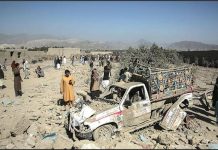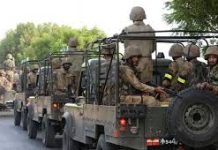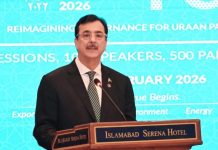– By Abdul Rafay
Gilgit Baltistan, Pakistan: Under the lights of Pakistan’s upcoming election year, a new battle rages in the freezing north. In Gilgit-Baltistan, a remote and strategically important region bordering China and Afghanistan, resentment boils over as protests rise against economic hardship, political marginalization, and an overall feeling of neglect. While the
country focuses on the February 8th elections, echoes of unrest in Gilgit-Baltistan struggle to break through the media noise, raising concerns about the potential consequences for regional stability and national unity.
The fires of anger were originally ignited by an apparently unnoticed policy change: a December 2023 decision to raise the subsidized wheat price. However, in a region already dealing with inflation, limited job opportunities, and a pervasive sense of being left behind,
the price increase became a powerful symbol. It triggered protests, which quickly grew into a multifaceted movement, expressing the dissatisfaction of a population wishing for a brighter tomorrow.
It’s not just about wheat,” insists Fatima Ali, a young activist huddled amongst fellow demonstrators in Skardu’s main square. “It’s about feeling ignored, unheard. We see
development projects everywhere, but rarely reach us. We lack basic necessities, even land ownership is hidden in doubt.” Fatima’s sentiments echo the bigger demands woven into the protests. The movement’s major collaboration, the Awami Action Committee, calls for economic relief, including steps to reduce inflation and promote chances for long-term
development. But their goals go beyond economics. They hunger for political representation, wanting greater autonomy and a say in national decision-making. Gilgit-Baltistan, with its distinct cultural character and strategic location, is still a semi-autonomous territory.
Protesters perceive this as an inherent imbalance and want a fairer power dynamic inside the federation.
Adding fuel to the fire is the perceived media blackout. As journalists swarm campaign rallies and dissect political rhetoric, the situation of Gilgit-Baltistan receives limited attention. This difference hurts, enhancing emotions of marginalization and worsening the feeling of being forgotten. Local media outlets seek to bridge the gap, but their reach is limited in compared to the national focus. “It’s a double blow,” says local journalist Zahid Khan. “We attempt to
elevate their voices, but our reach is limited. The national media appears obsessed on the elections, ignoring a heating crisis that could have far-reaching consequences.”
Neglecting these demands could have serious consequences. Unheard and disregarded, frustrations may rise, risking stability in a sensitive border region. Already, whispers of radicalization, fuelled by a sense of marginalized, are spreading.
As Pakistan prepares for important elections, it cannot afford to ignore the building unrest in Gilgit-Baltistan. Engaging in open discourse, admitting concerns, and establishing significant adjustments are all important steps toward ensuring inclusivity and building trust. Only then will the echoes of protest become audible conversations, opening the path for a more peaceful and prosperous future for the region and the country as large. The moment to listen is now, before the whispers of dissatisfaction turn into a storm that encompasses not only Gilgit-
Baltistan, but the entire fabric of Pakistan.
February 3, 2024

























